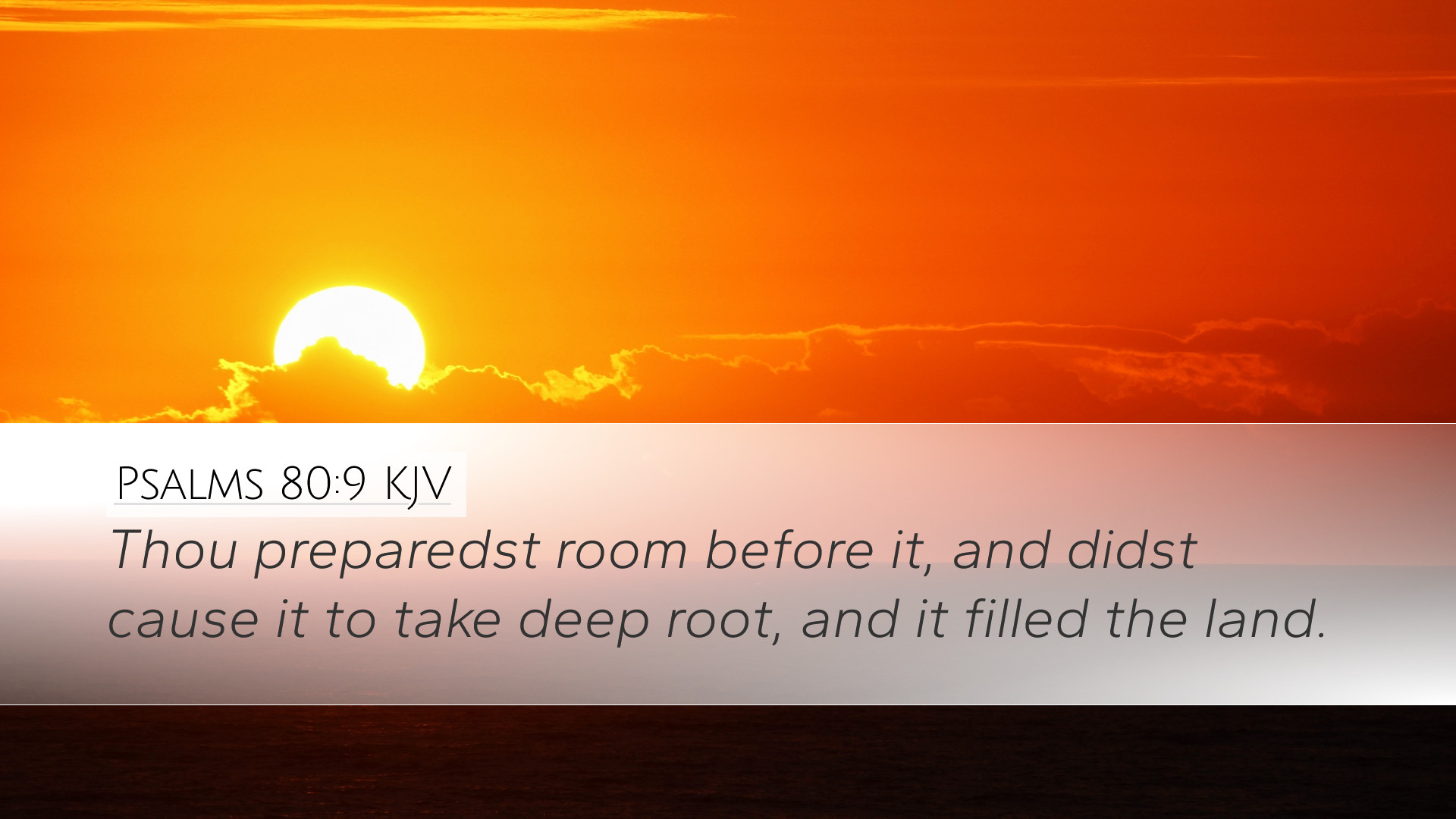Commentary on Psalms 80:9
Psalms 80:9 states: "Thou preparedst room before it, and didst cause it to take deep root, and it filled the land." This verse depicts a powerful metaphor regarding God’s preparation and nurturing of Israel as His chosen people.
Historical Context
This psalm is traditionally ascribed to Asaph, a Levite who played a significant role in the music ministry during the reign of David. The psalm represents a communal lament and reflects a period of distress, emphasizing the need for divine restoration.
Insights from Public Domain Commentaries
Matthew Henry
Matthew Henry emphasizes the imagery of a vine representing Israel, elaborating on the intimate relationship between God and His people. In this verse, he notes that the 'room' prepared signifies a secure and fertile environment where the vine could thrive. Henry states:
"God’s providence is seen in His careful attention to the needs of His people; He prepares a place for them and cultivates their growth."
Henry also highlights the importance of 'deep root' as a metaphor for stability and strength in faith—an assurance that Israel’s identity and purpose are grounded in God’s nurturing.
Albert Barnes
Albert Barnes provides a detailed analysis of the term 'deep root.' He interprets this to mean that Israel flourished under God’s watchful care:
"The deeper the roots, the more stable the plant; thus, a strong faith sustains the trials of life."
Barnes links this verse to God’s covenant with Israel, asserting that their prosperity was indicative of God’s favor. He suggests that when a community is rooted in faith, they are equipped to withstand challenges and adversities.
Adam Clarke
Adam Clarke encourages a broader understanding of the 'land' filled by the vine. He suggests that it not only refers to the physical territory of Israel but also embodies spiritual abundance. Clarke notes:
"The expanded influence of God’s people is a testament to His sovereignty and grace, providing a model for the Church today."
Clarke’s interpretation leads to a practical application for contemporary Christians, urging them to remain rooted in the scriptures, as the Church is called to spread and fill the earth with the knowledge of God.
Theological Implications
This verse serves as a reminder of God’s active role in both preparation and sustenance of His people. The metaphor of a vine resonates deeply regarding:
- God's Providence: God's meticulous planning and provision for His people is evident.
- Identity and Community: The community is described as a vine, suggesting unity and collective identity through Christ.
- Spiritual Growth: The emphasis on deep roots points toward the necessity of foundational faith and knowledge in order to thrive spiritually.
- Divine Restoration: The context of lament reinforces the understanding that, despite challenges, God remains committed to restoring His people.
Practical Applications
- Strengthening Faith: Just as Israel was nurtured, believers today should seek to deepen their roots in faith through prayer, study, and community.
- Restoration and Hope: This passage offers a powerful assurance that God desires to restore His people, providing hope for those enduring spiritual or communal struggles.
- Fostering Community: Churches must work together as a unified body, supporting one another to flourish under God’s care.
- Evangelism: As the vine filled the land, the Church is called to spread the gospel, ensuring the growth of God’s Kingdom on earth.
Conclusion
Psalms 80:9 encapsulates a rich tapestry of theological, historical, and practical elements worth exploring. It teaches us about the nature of God as a caretaker and the responsibilities of His people in responding to His grace. The insights derived from various commentaries provide a framework for deeper reflection and action. Pastors, students, theologians, and scholars can engage with this passage, drawing parallels to contemporary church life and personal faith journeys.


